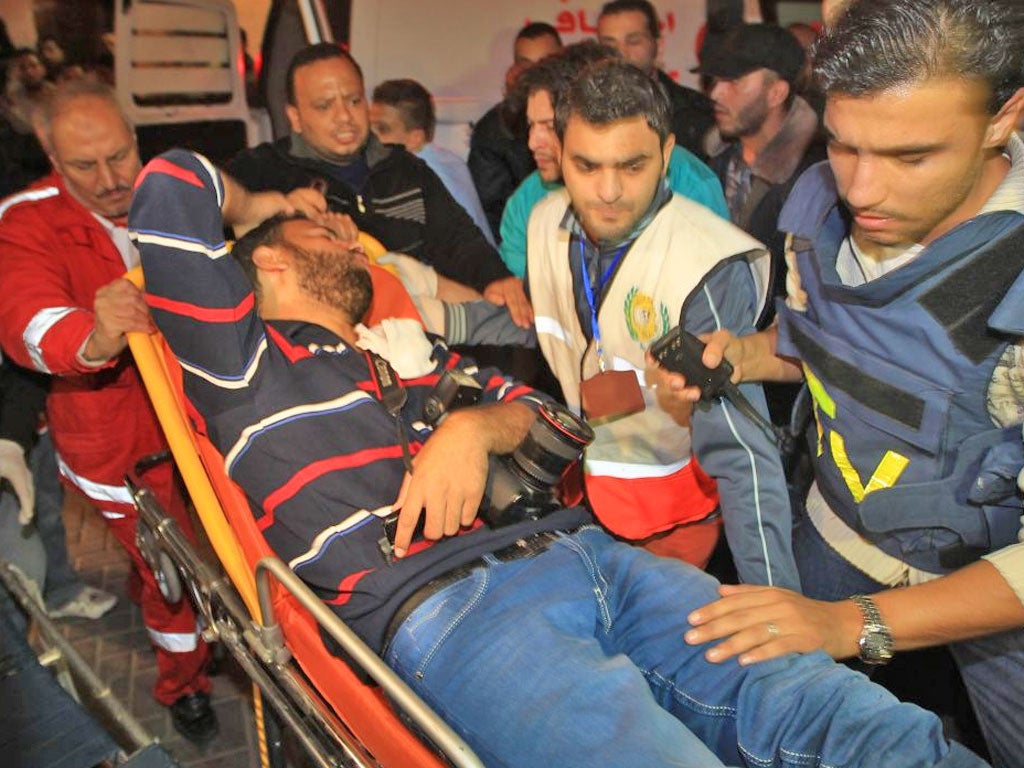Overwhelmed Palestinian doctors run out of life-saving medicines
Pandemonium in Gaza City hospital as survivors are pulled from rubble

Health authorities in Gaza warned last night of a critical shortage of life-saving drugs and medical supplies as casualties threatened to overwhelm the main Al Shifa hospital in the city.
The World Health Organisation said it was "deeply concerned" about the escalating situation and appealed for $10m (£6m) of funding over the next three months.
At the 700-bed Shifa hospital, where 80 per cent of casualties are taken, many have been admitted with severe burns or crush injuries from falling masonry.
All hospitals have cancelled routine surgery and were yesterday discharging less urgent patients or moving them by ambulance to hospitals outside Gaza, including in Egypt.
There were scenes of pandemonium at Al Shifa Hospital as children were brought in covered in blood, some of them dead. More children followed who looked like they had been "dug out of the rubble", the BBC correspondent Paul Danahar reported.
"There is screaming and crying and chaos. A nurse has broken down and is crying in the corner. Her colleagues are trying to comfort her. Awful scenes here," he wrote.
The Ministry of Health in Gaza said it had run out of 192 essential drugs – 40 per cent of the essential medicines list – and held zero stocks of 586 medical disposables – items such as dressings and syringes – accounting for 65 per cent of the essential list.
Tony Laurance, the head of the WHO office for Gaza and the West Bank, said the Palestinian Authority was $400m overspent and there were drug and medical equipment shortages across the region. But they were worst in Gaza.
"Our biggest concern is the shortage of supplies," he said, appealing for donors to provide cash that could be spent on the most urgently needed items, including the antibiotics cefazolin and ciproflaxin for injection, saline solution and chest drains for crush injuries.
At the time of the 2009 war, hundreds of tons of medicines were donated that were useless, he added.
"People cleared out their bathroom cabinets and donated the contents. The gesture was generous and well meant. But at the end of the war we had 30 warehouses full of drugs that we did not need.
"The shortages are affecting ordinary patients, too. There are lots with heart problems and cancer. We need ranitidine for ulcers and bicarbonate solution for kidney dialysis. These patients face a double disadvantage of having to move out to make room for the casualties and being unable to get their drugs."
Of the 21 WHO medical clinics in Gaza, 11 are closed because they were in areas targeted by air strikes. The head of the WHO Gaza office, Mahmoud Daher, recounted that the windows of his house were blown out and the interior destroyed by an explosion as he and his family sheltered in the cellar.
The bombing and shelling takes a psychological toll as well. The Gaza Community Mental Health programme found during the 2009 war that children were affected by bed-wetting, nightmares, sleeplessness and behavioural disorders. Post-traumatic stress disorder increased, leaving a legacy of on-going raised levels of depression.
"Stress can be treated – depression persists," Mr Laurance said.
Join our commenting forum
Join thought-provoking conversations, follow other Independent readers and see their replies
Comments
Bookmark popover
Removed from bookmarks